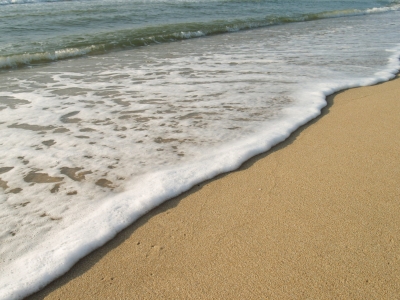When I was walking on the beach the other day, I saw a huge block of polystyrene with half-inch thick steel plate attached to either side of it. The edges of the steel plate had been broken rather than cut, and I wondered what it had been and where it had come from. The steel on both sides had become the home to a large number of large barnacles, so this piece of flotsam had obviously been around the water for a long time. I wondered if it had been part of the river walk which had broken up during the 2011 Brisbane flood. Maybe not, but it was certainly part of something substantial, using steel of that thickness.
I had never seen anything like it, and neither had a neighbour who happened to pass at that time. He was obviously having similar thoughts, as he attempted to move the huge item, but found it was much too heavy to budge in the slightest.
However, on the next high tide, when I looked out, I saw it floating past, as if it was as light as a feather.
This reminded me of something I had read in the Tao Te Ching about the power of water:
Water is the softest and most yielding substance.
Yet nothing is better than water,
for overcoming the hard and rigid,
because nothing can compete with it.
Everyone knows that the soft and yielding
overcomes the rigid and hard,
but few can put this knowledge into practice.
We know that water is a powerful force. We can see the results of such force in the hardest of rocks and the strongest of steel. Yet it is the power of its persistent gentleness which lifted this huge heavy object and carried it further down the beach.
This gentle persistence can also achieve our aims in life.
We have no need to stand strong and rigid in competition against our enemies. We merely need to be like water – gentle and persistent.
The Tao Te Ching advises further:
Gentle interventions, if they are clear, overcome rigid resistances.
If gentleness fails, try yielding or stepping back altogether.
When the leader yields, resistances relax.
If our persistence fails, we need to be like the tide and retreat and try again another day.
I thought this seemed like good advice to bear in mind when contemplating the best approach to changing others’ behaviour. Rather than aiming to be strong and rigid, in competition against our enemies, perhaps the best approach is gentle persistence.
We learned from Abraham that, in order to manifest our desires, we merely have to stop paddling our canoe against the tide. Yet we often feel as though we have to resist the tide that the universe is bringing us, and we paddle like crazy to escape a situation, only to find ourselves right back where we started.
Just like the tide which carried this huge block along the beach, if we allow it to, the tide of the universe will carry us to a new destination also.
Sometimes, we resist because we think the next stop our flotsam will land will be worse than the place we have just left. But the tide never stays still, and if we allow it to, it will carry us to where we wish to go.
Just like water, we need to go with the flow. We need to be gentle and persistent, and if necessary, retreat and try again another day.
There are many lessons we can learn from water. There are many lessons to be learned from all of nature, as nature is the manifested Tao. The power of water is the power of the Tao, the power of God.
In fact, we are all part of the manifested creation of God, and therefore we can learn about God from every part of creation. That same power exists in each one of us.
It is easier to see the lessons in the natural world, because we don’t see too many egos paddling against the tide in nature. However, given sufficient awareness, we can learn about God from all parts of God’s creation, including from those beings who persist in paddling against the tide.
Have you ever considered what we can learn from God’s creation?
Are there any particular lessons you have had which you would like to share?
Image courtesy of Rawich at FreeDigitalPhotos.net


Leave A Comment